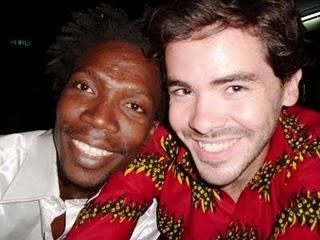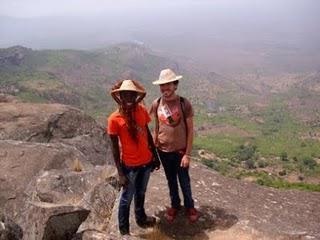- Inscribed on the Statue of Liberty on Ellis Island in New York City
“Ouvrez les frontieres, ouvrez les frontieres…” [open the borders, open the borders...]
- Tiken Jah Fakoly
“Not everything that is faced can be changed. But nothing can be changed until it is faced.”
- James Baldwin
I never in my wildest dreams would have imagined this for myself. The cultures are just too different, the language barrier is just too high, the potential just isn’t there, I would have said. But if my time in the Peace Corps has proven anything to me, it’s that life is full of surprises.
I would like to make a formal introduction. Readers, I present to you: my boyfriend, Norbert. He was born and raised in Abidjan, Cote d’Ivoire. When he was 18 years old, he won a scholarship to study fashion design in Paris. He has since worked successfully in the fashion industry throughout West Africa and in France. His most recent project: creating and organizing Ouagadougou’s first ever fashion week (brush up on your French and read about it here under "promotion de la mode").
Norbert is fun, thoughtful, charming, and vivacious. He understands Western culture to at least the same degree that I understand African culture, probably even better. We are comfortable navigating either culture, but both of us still have much to learn. We communicate exclusively in French; Norbert doesn’t speak a word of English.
We met through friends of friends while I was working in Ouagadougou in August. At the time, I knew I was bound for Conakry, so the sparks that flew were somewhat dampened. We saw each other a few times before I left for Guinea, but we didn’t think we’d see each other again.
Then I finally arrived in Guinea, only to get stuck in the strife there. I had the option to take a temporary leave of absence from my Peace Corps service. But where would I go? I took a chance, went out on a limb. I asked Norbert if he could host me for a while, if I came back to Burkina Faso. He considered it, then said yes. So I flew back to Ouagadougou.
We spent day after day together, week after week. We ate together. We traveled together. We lived together. We learned about each other’s lives, and we fell in love with each other.
Agreeing that what we had was too valuable to throw away, we started to discuss our future. Although I didn’t know what the immediate future held for me and my Peace Corps service, I knew that when my service was finished, I wanted to live in New York City and study at Columbia University. The idea of living in America had never before crossed Norbert’s mind, but it was now enticing. If he could move to America and learn English, that would open up a whole new world for his fashion work. After some reflection, he agreed that he wanted to come to New York with me. It made sense for both of us. After my studies there, we could move anywhere in the world.
And then, for the first time ever, I started researching immigration. For a citizen of Cote d’Ivoire (or of any African country), getting just a temporary visa to come to the United States is very difficult. Citizens of developing countries have to overcome the assumption of immigration intent by demonstrating significant ties to their current residence, and this is completely up to the discretion of officers at US embassies. The other option is to try for a long-term immigrant visa or green card, but that can be even harder. Marrying an American is one of the very few reliable paths to permanent residency.
Earlier in my Peace Corps service, I had attended the marriage of a woman Peace Corps volunteer to a Burkinabé man in Gaoua, Burkina Faso. Their plan was to move to America shortly after the marriage. At the time, I never imagined anything of the sort for myself, but I was very happy for them, that they could share their lives together in the place of their mutual choosing.
And now I thought that I could do a similar thing for myself. Of course I couldn’t marry Norbert anywhere in West Africa, but I could bring Norbert to Massachusetts, get gay married there, and that would be that. We are totally ready to make that commitment. But then I researched more, and was surprised at what I discovered.
Although gay marriage is legal in several states in the US, these marriages are not recognized in any way by the federal government. That’s because in 1996, the US passed the Defense of Marriage Act (DOMA). This act set the national definition of marriage as a union between one man and one woman, no matter what other legislative bodies say, be those legislative bodies outside the US, or inside the US. So same-sex couples who are legally married in Canada or South Africa or even Connecticut have no recognition of their marriage from the US federal government. That means they have no recognition of their relationship from US immigration law. But there must be some other options, right?
The fact of the matter is that although many countries in the world offer some legal avenue for same-sex couples to sponsor each other for immigration purposes, the US offers none. As far as the US government is concerned, my relationship with Norbert is nothing.
I had no idea.
I joined the Peace Corps for a lot of reasons, and pride for my country was an important one among them. I was excited about the cultural sharing, and to educate others about the land of the free and the home of the brave. Although I was deeply disappointed after learning about this bigoted immigration policy, I am still proud that I can raise my voice against it.
I could pick any single woman off the street and get her a fiancée visa to the US by simply declaring my intention to marry her. No matter who the woman is, the legal avenue is there. But because Norbert and I are both men, I have no legal standing to help Norbert immigrate to the US. That is wrong.
This is why gay marriage matters, to me. This is why the US needs to legalize gay marriage nation-wide. It’s the right thing to do.
There is reason to believe that DOMA will reach the Supreme Court, where it will be struck down. But things like that are slow, and my Peace Corps service is finishing soon. Even if congress passes the slightly-more-politically-appetizing Uniting American Families Act (UAFA), which would simply allow same-sex couples to sponsor their partners for immigration purposes, it probably won’t do so in time to alleviate our immediate worries.
Norbert is currently paying me an extended visit in Guinea. We know he is incredibly lucky. He applied for a US tourist visa in Ouagadougou, and it was granted. He is now allowed to travel to the US for a short amount of time. What will we do when that time is up? We’ll cross that bridge when we come to it. It frustrates me that our relationship has no recognition from my country.
But if enough people learn about this issue and take a stand, I am confident that, one day, we can achieve marriage equality for all.
~

Norbert and I in Ouagadougou

"La Dame du Mali," a mountain that looks like a woman's profile near my village.
 Norbert and I atop the Dame du Mali
Norbert and I atop the Dame du Mali
~
Norbert and I aren’t the only ones. Learn more about the struggles of same-sex bi-national couples by reading this Human Rights Watch document Families, Unvalued.
This movement needs as much exposure as possible. Get involved in the fight for immigration equality at immigrationequality.com, especially their action fund blog, and at stopthedeportations.blogspot.com.
Too many couples are being hurt through discriminatory US immigration policy. Call your congressperson in support of UAFA today.
